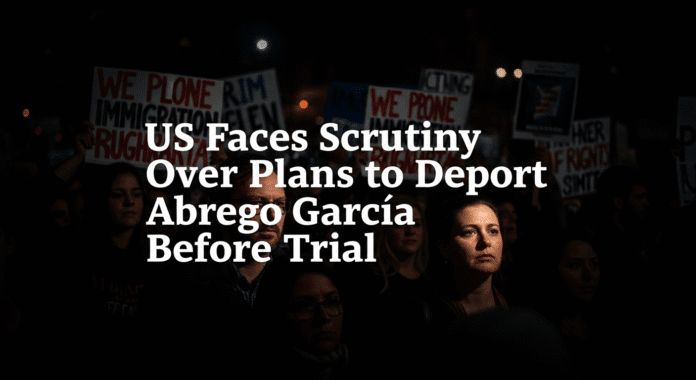Conflicting government statements and a high-stakes lawsuit put America’s immigration and justice systems under the microscope.
The U.S. government’s plan to deport Kilmar Abrego Garcia before his human smuggling trial has ignited a firestorm of controversy, exposing deep rifts in federal policy and raising urgent questions about due process and government accountability. At the heart of the debate is a simple yet critical matter: Should a non-citizen be deported before facing trial? The answer could reshape how the nation balances justice and immigration enforcement for years to come.
The Man at the Center: Who Is Kilmar Abrego Garcia?
Kilmar Abrego Garcia, a Salvadoran national, has built a life in Maryland with his American wife and child since 2012. Despite past accusations of domestic violence, which never led to a conviction, Abrego Garcia found himself at the center of a judicial and political storm when an administrative “clerical error” in March 2025 resulted in his deportation to El Salvador. During his detention in the notorious CECOT prison, he reportedly endured beatings, sleep deprivation, and psychological torment—a situation detailed in court filings and backed by his legal team’s evidence.
Following international legal intervention by the U.S. Supreme Court, which ordered his return, Abrego Garcia was indicted on federal human smuggling charges originating from a 2019 traffic stop. He has pleaded not guilty and now remains in Tennessee custody, facing a trial that has become emblematic of the broader struggle between executive actions and constitutional rights.
Conflicting Government Messages: Who Decides What’s Just?
The Justice Department’s Shifting Stance
In a dramatic courtroom revelation, Justice Department attorney Jonathan Guynn stated that if Kilmar Abrego Garcia is released before his trial, deportation proceedings will be launched immediately. This claim starkly contrasts with earlier assertions from both the Justice Department and White House, which insisted that Abrego Garcia would first stand trial in U.S. courts before any action on deportation was taken.
Last month, senior officials dismissed reports of a pretrial deportation as “fake news,” reassuring the public that justice would be served on American soil. The sudden shift in the government’s stance has left legal observers and affected communities scrambling for clarity.
“The government’s actions shock the conscience and demand immediate, sustained judicial relief,” argued Abrego Garcia’s attorneys in a recent court filing, underscoring the gravity of the situation.
Legal and Political Fallout
This contradictory approach raises critical due process concerns. The U.S. Constitution guarantees a fair trial to all individuals, regardless of citizenship. Deporting a defendant before trial not only jeopardizes that right but also risks eroding faith in the judicial system’s impartiality. Legal scholars warn that permitting deportation before a trial could set a dangerous precedent, undermining the integrity of American justice.
Chris Slobogin, a law professor at Vanderbilt University, described the case as “a watershed moment for immigration law.” He warned, “If the government can simply deport someone before trial, what’s to stop them from repeating this over and over without accountability?”
The Legal Maze: How the System Handles Non-Citizen Defendants
Standard Procedures and Precedents
Under U.S. law, non-citizen defendants often find themselves ensnared in a dual-track system. On one side is the criminal justice process, which offers various protections, while on the other lies the immigration apparatus that may pursue deportation post-conviction. Generally, deportation serves as a consequence for a criminal conviction rather than a pretrial measure. In cases where deportation appears imminent, judges have at times delayed removal to protect a defendant’s right to a fair trial.
The Supreme Court’s decision in Padilla v. Kentucky requires defense attorneys to advise non-citizen clients about the potential immigration consequences of a guilty plea. Despite these safeguards, systemic flaws persist. A 2023 report by the American Immigration Council revealed that nearly 1% of deportations involve individuals with valid legal claims to remain in the United States—translating to thousands of wrongful removals every year.
The Judge’s Dilemma
In response to the escalating controversy, U.S. District Judge Paula Xinis is considering a request from Abrego Garcia’s attorneys to transfer him to Maryland if granted release from custody. This judicial maneuver is aimed at shielding him from an immediate deportation order while ensuring his right to a fair trial. Although such transfers are rare, they highlight the tension between enforcing immigration laws and upholding constitutional rights, ultimately challenging the balance that America strives to maintain in its legal system.
Holding the Government Accountable: The Lawsuit
Claims of Wrongful Deportation and Torture
Beyond his criminal charges, Kilmar Abrego Garcia has taken legal action against the Trump administration. His lawsuit alleges that his deportation violated a standing court order and led directly to his brutal treatment in El Salvador’s CECOT prison. His legal team contends that the wrongful deportation and subsequent detention constitute not only a violation of his constitutional rights, but also an affront to international human rights norms.
The lawsuit has been bolstered by whistleblower testimony. A former Justice Department lawyer, Erez Reuveni, testified that senior DOJ officials attempted to mislead the courts about Abrego Garcia’s case. This allegation adds a layer of complexity that stretches beyond legal technicalities, touching on broader issues of government transparency and accountability.
The Government’s Response
In response, the Trump administration has sought to dismiss the lawsuit, arguing that the case is moot since Abrego Garcia has already been returned to the U.S. However, Judge Xinis characterized the dismissal motion as “meritless” and underscored the need for the government to address its conflicting actions and statements.
Both the administration and Salvadoran President Nayib Bukele have denied the allegations of torture. Bukele has publicly dismissed the claims as “fabricated,” while government spokespeople have maintained that every action taken was within legal boundaries. In contrast, advocacy groups and legal experts argue that this case clearly illustrates the dangerous mingling of immigration enforcement with politically motivated prosecutorial tactics.
The Bigger Picture: Implications and the Call for Reform
Systemic Flaws and Policy Challenges
The case of Kilmar Abrego Garcia is not an isolated incident. In 2024, the Department of Homeland Security acknowledged over 1,200 wrongful deportations due to clerical errors alone. Moreover, non-citizens accounted for 50% of federal prosecutions, with immigration-related offenses forming a substantial portion of those cases. These figures expose persistent flaws within the system and provide a stark reminder of the human cost of bureaucratic mismanagement.
Advocacy groups, including CASA and the ACLU, call for sweeping reforms. They argue for:
- Enhanced oversight of ICE and improved training that minimizes human error.
- The establishment of independent review boards to investigate wrongful deportations.
- Stricter judicial standards for evidence and the use of cooperating witnesses in immigration cases.
Public Trust and Political Ramifications
Conflicting government messages and the apparent willingness to sidestep due process have seriously undermined public trust. When officials consecutively flip their positions—from affirming a trial-first approach to openly discussing immediate deportation—the public becomes skeptical about the fairness and consistency of government actions. This skepticism is not just a legal concern; it carries significant political weight, particularly among communities already vulnerable to harsh immigration policies.
“This is about more than one man,” asserted a spokesperson from CASA. “It is about whether America will continue to honor its promises of justice and due process for every person who enters its borders.”
Prospects for Future Reforms
Legal experts believe that the high-profile nature of this case could serve as a catalyst for broader reforms in both immigration and criminal justice policies. The controversy has already spurred discussions in congressional hearings and academic circles about the need to reexamine how non-citizen defendants are treated. The push for reforms centers on achieving a balance between safeguarding national security and protecting individual rights—a balance that is increasingly challenged by current practices.
Justice, Not Expediency
The case of Kilmar Abrego Garcia underscores a critical juncture in American policy and legal practice. The decision on whether to allow deportation before trial is far more than a legal technicality. It embodies the intersection of immigration, human rights, and judicial fairness. At stake is not only the fate of one man but also the integrity of the U.S. justice system and the trust that the public places in its institutions.
As the legal battle continues, it is imperative that citizens demand transparency, due process, and accountability from their government. Stand informed, ask hard questions, and support reforms that ensure justice is not sacrificed for expediency.
Take Action:
Contact your local representatives and advocate for policies that protect due process and prevent wrongful deportations. Stay vigilant and support organizations fighting for immigrant rights and judicial fairness.




